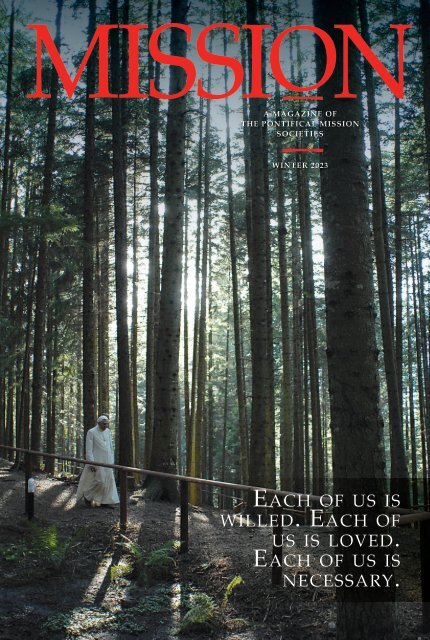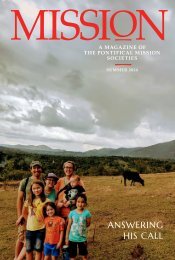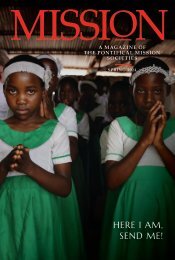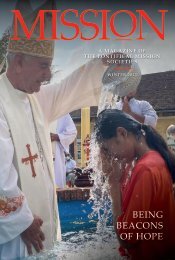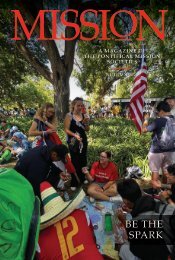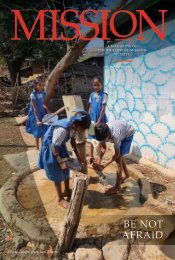MISSION Magazine Winter 2023
Each of us is willed. Each of us is Loved. Each of us is necessary.
Each of us is willed. Each of us is Loved. Each of us is necessary.
Create successful ePaper yourself
Turn your PDF publications into a flip-book with our unique Google optimized e-Paper software.
A MAGAZINE OF<br />
THE PONTIFICAL <strong>MISSION</strong><br />
SOCIETIES<br />
WINTER <strong>2023</strong><br />
Each of us is<br />
willed. Each of<br />
us is loved.<br />
Each of us is<br />
necessary.
“Faith does not spare us life’s burdens and<br />
tribulations, but it does allow us to face them<br />
in union with God in Christ, with the great<br />
hope that does not disappoint…”<br />
~ Pope Francis<br />
4<br />
BENEDICT,<br />
MAY YOUR JOY BE COMPLETE<br />
8<br />
From The Missions<br />
SOUTH SUDAN: <strong>MISSION</strong>ARIES<br />
AS BUILDERS OF PEACE<br />
MALAWI: GOGOS IN MALAWI<br />
BURUNDI: BRINING JOY TO THE<br />
CHILDREN IN THE WORLD’S<br />
POOREST COUNTRY<br />
16<br />
EDITOR’S NOTE<br />
On the cover<br />
“In undertaking his ministry,<br />
the new Pope knows that his<br />
task is to bring the light of<br />
Christ to shine before the men<br />
and women of today: not his<br />
own light but that of Christ”,<br />
Pope Benedict XVI, April<br />
2005.<br />
Benedict XVI died emeritus<br />
but was buried as pontiff, and<br />
as such we honor him with this<br />
especial edition of <strong>MISSION</strong>,<br />
focused on his love for Christ,<br />
evangelization, and also Africa,<br />
which he described as the place<br />
God chose as his refuge.<br />
follow us at @TPMS_USA<br />
The Society for<br />
THE PROPAGATION OF THE FAITH<br />
A Pontifical Mission Society<br />
PUBLISHER: REV. MSGR. KIERAN E. HARRINGTON,<br />
NATIONAL DIRECTOR<br />
EDITOR/WRITER: INÉS SAN MARTÍN<br />
PUBLISHED BY THE NATIONAL OFFICE OF<br />
THE SOCIETY FOR THE PROPAGATION OF THE FAITH<br />
IN COOPERATION WITH DIOCESAN OFFICES IN THE UNITED STATES<br />
©THE SOCIETY FOR THE PROPAGATION OF THE FAITH<br />
MEMBER, CATHOLIC MEDIA ASSOCIATION<br />
Receiving duplicate copies?<br />
Please send ALL labels, indicating correct one, to<br />
Circulation Dept., <strong>MISSION</strong> <strong>Magazine</strong><br />
70 West 36 th Street, 8 th Floor, New York, NY. 10018<br />
(212) 563-8700<br />
We welcome your ongoing<br />
feedback and your “letters to<br />
the editor,” ever grateful for<br />
your prayers and help. If you<br />
prefer to send an “email to<br />
the editor,” you can send it to<br />
contact@missio.org<br />
Visit us at our home on the web:<br />
www.OneFamilyInMission.org
2 3<br />
Photographs (left to right): Monsignor Kieran Harrington<br />
with a group of students in Saint Joseph School in Lincoln,<br />
Nebraska. Father Jimmy Jeanfreau in an undated picture,<br />
during a mission trip<br />
Dear sisters and brothers in Mission,<br />
I write to you today from Rome, where I was privileged to concelebrate the<br />
funeral Mass of Pope Benedict XVI and pray at his tomb. I also remembered all<br />
of you who are involved in The Pontifical Mission Societies, your prayers and<br />
your intentions when I went to the tombs of the Apostles.<br />
Benedict XVI was a man who deeply inspired me: he was a wonderful teacher,<br />
and with his words and his witness modeled us all in the way of greater holiness.<br />
Even in his retirement, as Pope Francis said, he helped sustain the Church with<br />
his prayer.<br />
Since becoming National Director of The Pontifical Mission Societies eighteen<br />
months ago, I have been inspired to witness first-hand how the prayers and<br />
offerings from the Church in the United States sustain so many Christian<br />
communities in the missions. Moreover, it has been a singular grace getting to<br />
know so many of you, our faithful supporters. I read every letter and appreciate<br />
every donation that we receive, whether great or small. Thank you!<br />
As we begin this New Year allow me to introduce you to three of the many<br />
people who inspire me.<br />
Just before Christmas I visited Sister Marie Jacqueline and the children of<br />
Saint Joseph School in Lincoln, Nebraska. Talk about a school that promotes<br />
the Missions. These boys and girls don’t just put a few dollars in a “mite box”<br />
to be sent to mission territories. They themselves are learning about the many<br />
needs of the Church in the missions, praying intensely for those serving in<br />
the missions and Christians living in the missions, and sacrificially giving to<br />
support the missions.<br />
Several months ago, I opened the mail and found a significant check from<br />
one of our donors. He had been giving for 30+ years and his contributions were<br />
modest. I called and asked him if he minded me paying him a visit to see what<br />
had inspired such generosity. And so at the end of November, I visited Dodge<br />
City, Kansas, to sit down with Mr. Donald Pendergrast. Don had retired some<br />
years ago, having run an extensive program for Autistic children and those<br />
with developmental disabilities. He had discovered a pressing need for such<br />
an initiative in his community, and set out to help: that’s just the kind of guy<br />
Don is, and why he was giving to the Propagation of the Faith and the Society<br />
of Saint Peter.<br />
In early December, Father Jimmy Jeanfreau, diocesan director for the<br />
Archdiocese of New Orleans, went to the House of Our Father. He was a<br />
carpenter, like our Lord, and was killed late last year in a freak accident in<br />
his woodworking shop. Father Jimmy was the pastor of a vibrant, suburban<br />
parish, but he had served as a missionary in Latin America, and he never failed<br />
to go back each summer. Through email and text, he would constantly remind<br />
me that The Pontifical Mission Societies USA had to be faithful to the charism<br />
of our foundress, Blessed Pauline Jaricot, who believed every single one of us<br />
has a role to play in helping spread the Gospel. By word and example, he was<br />
a sincere apostle of Christ.<br />
These three Christians are representative of all of you. In our next issue, I<br />
will report back on my trip to India, where I am going in the hopes of having<br />
a better grasp of the needs of the local Church, and the upcoming preparatory<br />
meeting in Ponce, Puerto Rico, for what I know will be a historic American<br />
Missionary Congress, to be held in Puerto Rico in 2024.<br />
Your brother in Mission,<br />
MONSIGNOR KIERAN HARRINGTON
4 5<br />
Benedict,<br />
may your joy be complete<br />
When German Cardinal Joseph Ratzinger was<br />
elected to steer the Barque of Peter in 2005 and<br />
took the name of BENEDICT XVI, it was seen<br />
as a clear sign that he would have Europe in his<br />
heart and as his priority.<br />
After all, he explained he had chosen his name after both Pope Benedict<br />
XV (1914-1922), “that courageous prophet of peace who guided the Church<br />
through turbulent times of war,” and Saint Benedict of Nursia, co-patron of<br />
Europe, whose memory evokes the Christian roots of the Old Continent.<br />
There is, however, a different thread that unites Pope Benedict XVI with both<br />
the faith he professed and the name he took, one which is much more centered<br />
in the mission ad gentes than in Europe: On April 16, 1783, the illiterate and<br />
holy vagabond Benoît-Joseph Labre died in Rome, loved by the people of the<br />
city he adopted after wandering throughout Europe as a pilgrim and rarely<br />
sleeping in a bed.<br />
On that same day 144 years later, the youngest<br />
of the Ratzinger siblings was born in Marktl am<br />
Inn. Following the ancient custom, his parents<br />
gave him the name of the saint whose feast day<br />
was celebrated on that day: Joseph.<br />
Fast-forward 78 years, and the man baptized as<br />
Joseph would become Benoît – or, as the English<br />
world knows him, Benedict. Arguably the most<br />
brilliant theologian ever to sit in the Chair of St.<br />
Peter, he consciously put himself under the<br />
protection of a saint for whom God was not to<br />
be found in books but in the personal experience<br />
found during a pilgrimage.<br />
Pope Benedict XVI, who left us with 66 books,<br />
three encyclicals and four apostolic exhortations,<br />
pushing us to engage with him in the dialogue<br />
Photo credit: Vatican Media between faith and reason, also understood that<br />
in a clearly post-Christian society, if it wanted to<br />
answer the call to be the salt of the earth, the<br />
Church had to orient its efforts towards its still beating heart: the margins.<br />
His successor, Pope Francis, would take this a step forward by adopting the<br />
name of the most beloved poor and itinerant Catholic preacher, St. Francis of<br />
Assisi, and would direct our eyes even further towards the outskirts and those<br />
forgotten by society.<br />
Christ at the heart of it all<br />
Pope Benedict XVI had a clear message for those working on the Church’s<br />
mission of evangelization: place Jesus Christ at the heart of any effort to share<br />
the Gospel.<br />
During his pontificate, he wrote seven messages for World Mission Day,<br />
each richer than the other in terms of what is the meaning behind the Gospel’s<br />
command to go and make disciples of all nations, and his expectations for those<br />
involved in the Church’s missionary call were high from the get go: “Unless<br />
the mission is oriented by charity, that is, unless it springs from a profound act<br />
of divine love, it risks being reduced to mere philanthropic and social activity.<br />
In fact, God’s love for every person constitutes the heart of the experience and
6 7<br />
proclamation of the Gospel, and those who<br />
welcome it in turn become its witnesses,”<br />
he wrote in 2006.<br />
And his entire magisterium was infused<br />
with a call to follow this call to take the Gospel<br />
to every country, city, town, and village,<br />
particularly there where Christ’s redeeming<br />
love has been forgotten, denied or shunned.<br />
For instance, in 2007, during homily in<br />
Aparecida, Brazil, opening the fifth general<br />
conference of the bishops of Latin America<br />
and the Caribbean, he said that the Church’s<br />
strength is rooted in believing in the “God<br />
who is love.”<br />
Hope, he went on to say, is not rooted in<br />
a political ideology, a social movement nor<br />
Photo credit: Vatican Media<br />
an economic system, but in the peace that<br />
Christ has won for us by his Cross, in the God who is love and took flesh, died<br />
and rose in Jesus Christ.<br />
Benedict invited the bishops- and the Church as a whole- to turn our gaze<br />
to Jesus, for the Church’s mission exists only as a prolongation of Christ’s<br />
mission: “As the Father has sent me, even so I send you.”<br />
“The Church considers herself the disciple and missionary of this Love:<br />
missionary only insofar as she is a disciple, capable of being attracted constantly<br />
and with renewed wonder by the God who has loved us and who loves us<br />
first,” he said. “The Church does not engage in proselytism. Instead, she grows<br />
by ‘attraction’: Just as Christ ‘draws all to himself’ by the power of his love,<br />
culminating in the sacrifice of the Cross, so the Church fulfils her mission to the<br />
extent that, in union with Christ, she accomplishes every one of her works in<br />
spiritual and practical imitation of the love of her Lord.”<br />
A special love for Africa<br />
Yet the fact that true hope is not rooted in earthly forces such as ideology, was in<br />
no way a call for the Church to be detached from every-day problems. In 2009,<br />
after returning from a visit to Africa, a continent he loved and defined as the<br />
place God chose as a refuge, Benedict XVI called on Catholics to be instruments<br />
of peace.<br />
“In the midst of the unfortunately numerous and tragic conflicts which still<br />
afflict various regions of that continent, the Church knows she must be a sign<br />
and an instrument of unity and reconciliation so that the whole of Africa may<br />
build together a future of justice, solidarity and peace, putting into practice the<br />
teachings of the Gospel.”<br />
Following the second Synod of Bishops for Africa, he wrote the Apostolic<br />
Exhortation Africae Munus, or “The Commitment of Africa,” in which he<br />
doesn’t dwell at length on the various socio-political, ethnic, economic or<br />
ecological situations they face daily and cannot be ignored because “Africans<br />
know better than anyone else how difficult, disturbing and even tragic these<br />
situations can very often be.”<br />
Instead, he chose to “pay tribute to Africans and to all the Christians of that<br />
continent who face these situations with courage and dignity. Rightly, they<br />
want this dignity to be recognized and respected. I can assure them that the<br />
Church loves and respects Africa,” Benedict wrote.<br />
In this humble edition of <strong>MISSION</strong> <strong>Magazine</strong>, we are doing the same, bringing<br />
you stories from South Sudan, Malawi and Burundi.<br />
Benedict, may your joy be complete<br />
The German pope, a brilliant man for all accounts who loved the piano-an<br />
instrument he played proficiently-, Christmas cookies and cats, always urged<br />
Catholics to build a personal relationship with Jesus, and to have this as the<br />
basis of any missionary effort: one cannot go out and proclaim Christ, proclaim<br />
the Gospel, without first having encountered He who loved us so much as to<br />
give us His only Son.<br />
Closing his homily for the funeral Mass for the man whom he described<br />
as a brother, Pope Francis said: “God’s faithful people, gathered here, now<br />
accompanies and entrusts to Him the life of the one who was their pastor...<br />
We want to do this with the same wisdom, tenderness and devotion that he<br />
bestowed upon us over the years. Together, we want to say: ‘Father, into your<br />
hands we commend his spirit’.”<br />
We join him in his final goodbye: “Benedict, faithful friend of the Bridegroom,<br />
may your joy be complete as you hear his voice, now and forever!”
8 9<br />
Missionaries<br />
as builders of<br />
peace<br />
Photographs (left to right): A girl prays for peace in South Sudan. Fr. Onesimo in his village.<br />
Six years after the end of a decades-long bloody war<br />
that ended in 2005, South Sudan got its independence<br />
from Sudan, becoming the youngest nation<br />
in the world. Yet the bloodshed started all over<br />
again in 2013, with a civil war. Brutal fighting broke<br />
out, characterized by extreme sexual violence,<br />
the use of child soldiers, and attacks on civilians along ethnic fault lines.<br />
Violence marked the entire life and vocation of Father Onesimo Keneyi<br />
Joseph Venansio who, as God only could have it, was born in 1977, on April<br />
16th - the same day as Pope Benedict XVI. When the second Sudanese civil war<br />
broke in 1984, the village where he lived with his family was besieged, and no<br />
one was allowed in or out for months. There was only one exception: Father<br />
Michael Barton, a missionary from the United States.<br />
“This Catholic priest was the only person who was allowed to come to us<br />
and give us courage, support us both materially and spiritually, giving us food<br />
for the body and for the soul,” he told MISSIO. “As a young boy, I saw what he<br />
did with us and for us, and I knew that I wanted to become a priest so, if war<br />
ever broke again, I too could bring my people support and encourage them to<br />
stay firm in their faith.”<br />
No one was able to leave the village, until the entire community was<br />
transported into Juba, where they lived as refugees. In 1994, at the age of 17,<br />
Father Onesimo joined the minor seminary. They were a small group back<br />
then, he said, but today, there are over 80 young boys in South Sudan’s central<br />
minor seminary - each of the seven dioceses has one - and 46 young men in the<br />
only seminary in the country.<br />
It did not take long for God to put Father Onesimo to the task in terms of<br />
bringing comfort to those affected by senseless violence: soon after his<br />
ordination in 2007, he was tapped by his bishop to assist in the funeral of 14<br />
teenagers who had been killed in a small town seven miles from the St. Joseph<br />
Parish in Juba where he served.<br />
“I feel like, without a priest, people in situations such as that one could easily<br />
lose hope, lose sight of the fact that life, when infused by the enormous gift of<br />
faith, is a tremendous gift that we are called to protect,” he said from Rome,<br />
Italy, where he was sent by his archbishop to study civil and canon law. “There<br />
is a dire need for highly educated people in my country. That is why I am here,<br />
though my heart, and my thoughts, are always in my home, with my people.”
10 11<br />
Sending a priest to Rome is an incredible sacrifice to a diocese in South<br />
Sudan: they receive no salary for their jobs, and most bishops can barely afford<br />
the estimated $300 that helps cover a priest’s meals for a month in a religious<br />
community.<br />
“If you need gas to visit the many parishes that are far from the centers of the<br />
city, or when the time comes to buy a Bible, medicines, or even a light bulb, we<br />
rely exclusively on the faithful, who are poorer than we are, or from Catholics<br />
all over the world, who support us through The Pontifical Mission Societies<br />
or Caritas.”<br />
An estimated 82 percent of the country’s population lives with $1.90 a day.<br />
About 400,000 people have died since the civil war broke in South Sudan in<br />
2013, and more than a third of the country’s 12 million people were uprooted,<br />
sparking Africa’s worst refugee crisis since the 1994 Rwandan genocide.<br />
Located in northeast Africa, this nation of 11 million people shares borders<br />
with some of the continent’s poorest countries, most of which have seen<br />
civil conflicts in recent years: African Republic, Central African Republic,<br />
Democratic Republic of the Congo, Ethiopia, Kenya, Sudan and Uganda.<br />
It is estimated that 2.2 million people, nearly 20 percent of the population, are<br />
internally displaced following the conflict - with the United Nations warning<br />
that up to 10 million will need food aid in <strong>2023</strong>.<br />
A peace deal was signed in 2019, with a lot of help from three local Christian<br />
leaders as well as Pope Francis and Anglican Archbishop Justin Welby, head<br />
of the Church of England; yet, the endemic violence continues, despite South<br />
Sudan often being labeled as a “forgotten country waging a forgotten war.”<br />
But Francis and Welby are asking us to pay special attention to this bleeding<br />
nation. To make their point, they will be visiting South Sudan from February<br />
3–5, after a papal visit to the Democratic Republic of Congo. In doing so, they<br />
will be fulfilling a promise made in 2019 and conducting a trip postponed first<br />
due to the COVID 19 pandemic and then again last year due to the Pope’s<br />
mobility issues .<br />
Photographs (left to right):Father Onesimo with seminarians. Primary school students during a<br />
recent visit to Juba<br />
By donating to The Pontifical<br />
Mission Societies, you help<br />
priests like Father Onesimo<br />
answer the call of being<br />
witnesses to the faith - sharing<br />
the Gospel, building peace,<br />
fostering life - in all the<br />
ends of the earth.
12 13<br />
Malawi:<br />
Where the<br />
poorest of the<br />
poor help their<br />
neighbors<br />
Photograph: Children in Malawi<br />
In Malawi, “gogo” is the word for grandmother.<br />
Gogos are the poorest of the poor. Many have lost<br />
their children to the HIV/AIDS pandemic and<br />
have orphaned grandchildren to love and care<br />
for. But for childless Gogos, like Gogo Nachisale,<br />
a 70-year-old living alone in Lilongwe in only a sugar cane shack with no windows<br />
or doors, even the unconditional love of a grandchild is a deprivation.<br />
This Gogo caught the attention of Father Vincent Mwakhawawa, who heads<br />
the Pontifical Mission Societies in Malawi. In one of the world’s poorest countries,<br />
where homelessness can be a chronic problem, he and his team decided to act and<br />
recruited the “smallest” ones among the small to help out: the children taking<br />
part in the local chapter of the Missionary Childhood Association (MCA).<br />
In a matter of weeks, they had raised the funds to build Nachisale a home in<br />
the rural community of St. Joseph Ludzi Parish in the Archdiocese of Lilongwe.<br />
“Love is something abstract. But during these past nine years, TPMS, and the<br />
MCA in particular, have helped me experience love, through the certainty that<br />
there is someone out there, in the United States, Spain, Australia, Argentina or<br />
in our neighboring diocese who cares.”<br />
“The children were the ones who pushed their parents to get involved,”<br />
Father Vincent said. “These kids, at 6, 7, 8 and 9 understood that in Nachisale,<br />
their neighbor, was Christ. We need more children like these children. None of<br />
them have things to spare. But what little they do have, they wanted to share.”<br />
“The children were<br />
the ones who<br />
pushed their parents<br />
to get involved.”<br />
~ Father Vincent<br />
The story of compassion and care for this childless grandmother is but one<br />
of many made possible by The Pontifical Mission Societies (TPMS). They<br />
understand that a gogo’s greatest need is twofold –spiritual and physical. They<br />
must minister to the whole person: body, mind, and spirit… And, so, Fr. Vincent<br />
sprang into action with proactive communication that began from the pulpit<br />
and, - with a little help from text messaging technology, spread like wildfire.<br />
Father Vincent has been leading The Pontifical Mission Societies (TPMS) in<br />
Malawi for the past 9 years and is both expecting and hoping to be allowed<br />
back into parish life next year, when a new national director is chosen.<br />
He reflects, “The Pontifical Mission Societies have allowed me to see the<br />
universality of the Catholic Church in action,” he said. “You might not<br />
know their names, but you can have the certainty that at any given moment,<br />
somewhere in the world, there is someone praying for you, thinking of you,<br />
supporting you financially.”<br />
This idea of a fraternity among Catholics throughout the world is something<br />
the national TPMS office in Malawi works hard to instill in those who take part<br />
in the many initiatives they organize, particularly in the children who benefit<br />
from the Missionary Childhood Association.<br />
The Missionary Childhood Association, a society of TPMS, recognizes that<br />
the future of the world and the very existence of faith are in the hands of<br />
today’s children. In empowering the children of Lilongwe to help Gogo<br />
Nachisale, he has inspired the next generation of popes, bishops, clergy,<br />
religious, and lay missionaries.
14<br />
$270<br />
15<br />
gross national income<br />
Children participate in an event organized by MCA in Burundi<br />
Burundi: Impacting the<br />
future leaders of the<br />
world’s poorest country<br />
Burundi is a small landlocked country in the African Great Lakes region in<br />
central Eastern Africa, and based on gross national income - $270 - it is the world’s<br />
poorest country. Many factors contribute to a nation’s wealth, including its<br />
natural resources, educational system, political stability, and national debt.<br />
Though she wouldn’t put it in so many words, Laumy Luncha Alda Igiraneza,<br />
18, is uniquely skilled to make her country a better place for all, by inspiring one<br />
person at a time.<br />
For years Laumy participated in the activities of the national Missionary<br />
Childhood Association (MCA), known locally as Holy Childhood, and then<br />
moved on to lead her parish’s youth group. But the seed of leadership was<br />
planted by one of the 336 animators who accompany some 256,000 children in<br />
the 228 parishes Burundi has.<br />
During her years at MCA, she said, “I became conscious of my human dignity,<br />
became self-confident, aware of God’s love for me and all His people.”<br />
“I learned how to live well with others: my parents, neighbors, siblings,” she<br />
said. And in a country marred by widespread poverty, corruption, instability,<br />
authoritarianism, and illiteracy, Laumy also learned that it is not enough to work<br />
hard to improve oneself.<br />
“MCA taught me not to join people in their bad behavior, and that it is not<br />
right to leave them behind either,” she said. “Instead, we are called to lead them<br />
in change, see how we can help them see the errors of their ways, and lead a life<br />
in accordance with God’s plan for us, coming<br />
together in unity, as a community, and praying<br />
for those people of bad behavior so that they<br />
convert, because God cannot say no to the prayer<br />
of children!”<br />
Father Salvator Ngendabanyikwa has been coordinating The Pontifical<br />
Mission Societies and Missionary Childhood Association for the past nine years,<br />
and the phone line- the connection was too bad for a video call- couldn’t hide<br />
the pride he felt upon hearing Laumy, in the knowledge that if the quarter of<br />
a million children currently taking part in MCA activities finishes their cycles<br />
with a similar mentality, much is set to change for Burundi, a nation that borders<br />
Rwanda, the Democratic Republic of Congo and Tanzania.<br />
According to Father Salvator, Holy Childhood has a visible impact on the lives<br />
of children, helping them grow in their faith and giving them the courage to<br />
stand their ground while remaining polite, kind, and respectful of others.<br />
Not content with the visible changes in the kids, he wants to help them grow<br />
in their faith and also in responsibility by printing the Bible for Children in<br />
the local language- Kirundi- and selling them at the subsidized cost of U$D 2.<br />
Similarly, he wants to print a book for animators of MCA, which has already<br />
been written, but at U$D 5 each, the cost of printing the 1,000 books needed is<br />
right now prohibitive.
16 17<br />
Editor’s<br />
note<br />
In a world where we mostly consume our news online,<br />
the phrase “stop the press” is rarely used anymore. Yet<br />
we most definitely used it this month: as the printers were<br />
warming up for this issue of <strong>MISSION</strong> <strong>Magazine</strong>, the<br />
last one carefully crafted by my predecessor, our historic<br />
editor-in-chief Monica Yehle, the quiet, humble giant who<br />
was Pope Benedict XVI left this earth.<br />
Immediately following his death, we saw headlines speaking of a “controversial<br />
man.” And he was, perhaps, controversial, in the sense that he was placed at the<br />
helm of the Catholic Church by the Holy Spirit at a time when our culture tried to<br />
reduce our faith to a feeling, and he weathered the storm making us think. Being<br />
the wonderful teacher that he was, with 66 books, three encyclical letters, four<br />
apostolic exhortations and thousands of homilies, public audiences and speeches,<br />
he challenged us, modeling us in the way of greater holiness by proving that faith<br />
and reason go hand in hand.<br />
We couldn’t do less than honor the disrupting man he was than by racing against<br />
time to re-write and re-design the magazine, while still getting it out on the early<br />
side of winter.<br />
Having said that, as the new editor of <strong>MISSION</strong> <strong>Magazine</strong>, I also wanted to take<br />
a paragraph to introduce myself as a recovering journalist who, having spent the<br />
past nine years as a Vatican reporter traveling the world with Pope Francis, I am<br />
now helping with the communications of The Pontifical Mission Societies USA.<br />
One of the biggest honors for me in my previous professional life was telling<br />
the stories of the extraordinary every-day Catholics. We are working hard to<br />
make sure we can bring those stories to you. At the end of the day, this magazine<br />
is not about us, but about those who make up this family: the missionary priests,<br />
religious men and women and lay people, the millions who, thanks to their witness<br />
hear the Gospel for the first time, and you, who with your prayers and often<br />
generous gifts, keep the structure standing.<br />
We have a great team set up, and there are changes ahead in the layout of the<br />
magazine and also the periodicity of its publication. We ask for your patience- and<br />
prayers!- as we continue working on bringing you closer to the stories of those in<br />
the Pope’s missions.<br />
Until we meet again,<br />
Ines San Martin<br />
In support of those spreading the Gospel…<br />
The money needed to support those serving in the Pope’s missions comes<br />
from loving Catholics like you.<br />
Won’t you send whatever contribution you can in the enclosed envelope<br />
today so that the priests, religious and lay pastoral leaders in the<br />
missions may not only survive, but thrive, in their ministry?<br />
Dear Monsignor Kieran,<br />
Enclosed is my gift of:<br />
Thank you for supporting our missionaries.<br />
Please be assured of my prayers for you and your family.<br />
$250 $100 $75 $50 $25 Other $_____<br />
$700 (one year’s help, mission seminarian)<br />
$300 (one year’s help, Religious novice)<br />
$5,000 $2,500 $1,000 $500 Other $____<br />
I want to be a monthly donor to the Missions!<br />
I would like information on a Gift Annuity.<br />
Please contact me about remembering The Society for the Propagation<br />
of the Faith in my Will.<br />
Name<br />
email<br />
Address<br />
Monsignor Kieran<br />
City State Zip<br />
Send your gift, in your <strong>MISSION</strong> envelope, to:<br />
Monsignor Kieran Harrington<br />
Society for the Propagation of the Faith<br />
70 West 36th Street, 8th Floor, New York, NY 10018<br />
Your diocese will be credited with your gift; your gift is tax deductible.
Our National Assembly will take<br />
place in San Antonio on the last<br />
week of March.<br />
If you are in the area, you are<br />
welcome to join for Mass at the<br />
San Fernando Cathedral on<br />
March 29.<br />
Follow us on social for the<br />
latest updates: @TPMS_USA<br />
follow us at @TPMS_USA


